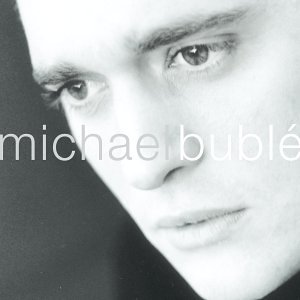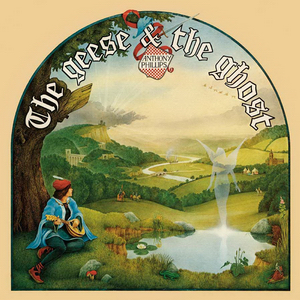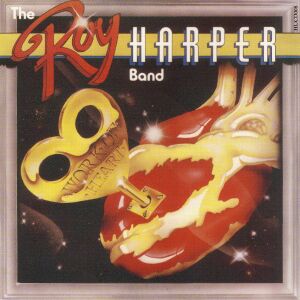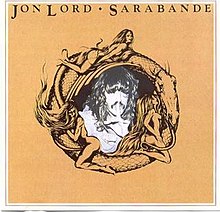
John Douglas Lord was an English keyboardist and composer. In 1968, Lord co-founded the hard rock band Deep Purple, and he became regarded as its leader in the early years. Lord performed on most of the band's most popular songs; he and drummer Ian Paice were the only continuous members in the band between 1968 and 1976, and also from when it was re-established in 1984 until Lord's retirement in 2002. He also spent time in the bands Whitesnake, Paice Ashton Lord, the Artwoods, the Flower Pot Men and Santa Barbara Machine Head.

Stormbringer is the ninth studio album by English rock band Deep Purple, released in November 1974. It was the band's second studio album to feature the Mk III lineup including vocalist David Coverdale and bassist/vocalist Glenn Hughes.

Diamonds On the Inside is the fifth album by American singer-songwriter Ben Harper, released in 2003. Although he did not explicitly credit the Innocent Criminals for the first time in 10 years, all the touring members continue to support him on the album. On this album, Harper brought on several new additions to his band, the first being guitarist Nicky Panicci in 2002 who is the first guitar player to be credited on a Ben Harper record. Panicci toured with Harper on the Diamonds on the Inside Tour for almost a year. After leaving Harper's band on his own accord, Marc Ford, formerly of The Black Crowes replaced Panicci and joined Harper's band.

Michael Bublé is the record label debut studio album by Canadian singer Michael Bublé. It was released on 143 Records and Reprise Records. The album was released on February 11, 2003. The album spawned four singles: "How Can You Mend a Broken Heart", "Kissing a Fool", "Sway" and "Spider-Man Theme".

Crises is the eighth studio album by English musician and songwriter Mike Oldfield, released on 27 May 1983 on Virgin Records. Oldfield started recording the album towards the end of his 1982 tour supporting his previous record, Five Miles Out. It marked a continuation of Oldfield's experimentation with more accessible music which began in the late 1970s; side one contains the 20-minute "Crises" and side two contains a collection of shorter songs which feature vocalists Maggie Reilly, Jon Anderson, and Roger Chapman. Oldfield produced Crises with drummer Simon Phillips, who also plays on the album.

Drag is a cover album by k.d. lang, released in 1997; most of its songs feature a smoking motif, although some address broader issues of dependence and/or addiction. The cover of Dionne Warwick's "(Theme from) Valley of the Dolls" was notably used in key scenes in the pilot episode and series finale of the Showtime comedy-drama series Nurse Jackie. Lang's cover of "Hain't It Funny" was part of the soundtrack for the 2002 film Talk to Her.
Martin Birch was a British music producer and sound engineer. He became renowned for engineering and producing albums recorded predominantly by British rock bands, including Deep Purple, Rainbow, Fleetwood Mac, Whitesnake, Black Sabbath, and Iron Maiden.

Olias of Sunhillow is the debut studio album by English singer-songwriter Jon Anderson, released on 9 July 1976 by Atlantic Records. When the progressive rock band Yes took a break in activity in August 1975 for each member to record a solo album, Anderson, having established himself as their frontman, decided upon a concept album that tells the story of four tribes of an alien race and their journey to a new planet after their home is threatened by a volcanic eruption. Olias, a magician, builds a spacecraft named the Moorglade Mover and is helped by fellow magicians Ranyart and Qoquaq to gather and carry the population to their new home.

Last Concert in Japan is an album by Deep Purple released in March 1977 in Japan and in June 1978 in Europe. Dedicated to Tommy Bolin, it records the last Japanese concert of the Mark IV-lineup that included Bolin. It was recorded on 15 December 1975 at the Tokyo Budokan and achieved gold certification in Japan.

Made in Europe is a 1976 live album released by Deep Purple, recorded on the final dates in April 1975 before Ritchie Blackmore left the group. It was released in November 1976, after the group had broken up. It is the band's third live album. They tried to gain the same success as they did with 1972's 'Made In Japan', hence the title, but it didn't perform as well commercially.

1984 is a studio album by the English keyboardist Rick Wakeman, released in June 1981 on Charisma Records. After reforming his band The English Rock Ensemble in 1980 and completing a European tour, Wakeman entered a recording deal with Charisma and began preparing material for a studio album. He decided on a concept album based on the dystopian novel Nineteen Eighty-Four by George Orwell. The lyrics are by Tim Rice.

The Geese & the Ghost is the first studio album by English musician and songwriter Anthony Phillips, released in March 1977 on Hit & Run Music in the United Kingdom and Passport Records in the United States. It was originally intended to be an album by Phillips and his former Genesis bandmate Mike Rutherford, but Rutherford's difficulty in devoting time to the project ended the idea. The album reached number 191 on the Billboard 200.
The Philharmonia Hungarica was a symphony orchestra, based in Marl, Germany, which existed from 1956 to 2001.

"Fireball" is a song by the English rock band Deep Purple, from the album of the same name. It was also released as the band's second single of 1971, and peaked at No. 15 on the UK Singles Chart.
Eberhard Schoener is a German musician, composer, conductor, and arranger. His activities combine many styles and formats. Originally a classical violinist and conductor of chamber music and opera, he was one of the early adopters and popularizers of the Moog synthesizer in Europe. In the 1970s he traveled to Indonesia and incorporated musical elements from Asia into his own work. He has collaborated with rock musicians such as Jon Lord and The Police and also with Electronic Music German Pioneer band Tangerine Dream on an orchestral arrangement for the "Mojave Plan" track for a live performance on a German TV show. He has composed film scores, videos, music for television, and an opera to be broadcast via the Internet. He has won numerous awards, including the 1975 Schwabing Art Prize for music, the 1992 Bambi Award for creativity and a lifetime achievement award at the Soundtrack Cologne Festival of Music and Sound in Film and the Media in November 2014.

Work of Heart is the 11th studio album by English folk / rock singer-songwriter and guitarist Roy Harper and was first released in 1982.
"Quark, Strangeness and Charm" is a 1977 song by the UK rock group Hawkwind, being the title track from the Quark, Strangeness and Charm album.

Windows is a live album by Jon Lord and the German conductor and composer Eberhard Schoener. The music and the record are primarily credited to Lord. It was taped at a concert in Munich, (West) Germany on 1 June 1974 and the music is a mix between progressive rock and orchestral late romantic/modernist styles.

After the 1969 classical / rock fusion Concerto for Group and Orchestra, Jon Lord was commissioned to write a follow-up. This was Gemini Suite, five long movements inspired by the members of Deep Purple, and performed live in September 1970 at the Royal Festival Hall with The Light Music Society Orchestra. Jon Lord then recorded it in the studio as his first solo project in 1971, with the London Symphony Orchestra conducted by Malcolm Arnold and soloists drawn from the rock world. Gemini Suite was an important step for Lord and led to albums such as Windows (1974) and Sarabande (1976).

First of the Big Bands is a studio album by Tony Ashton of Ashton, Gardner and Dyke and Jon Lord of Deep Purple, released in April 1974 by Purple Records in the UK and Europe and Warner Bros. Records in the US. The project was Ashton's and Lord's brainchild and continuation of their working relationship after Ashton Gardner & Dyke helped out on Jon Lord's soundtrack album The Last Rebel from 1971. Stylistically, First of the Big Bands was the precursor to Paice Ashton Lord's Malice in Wonderland album from 1977. Most of the album was recorded at Air and Apple Studios, London, with additional work being completed at De Lane Lea and Island.
















